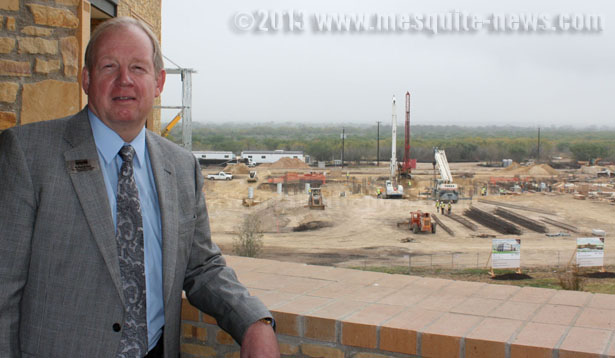
By Laura de Leon
During a Jan. 31 Board of Regents meeting, two line items submitted by Texas A&M-San Antonio were discussed and processed. Item 28: administrative change request was approved to change the name of the Schools of Arts and Sciences, Business, and Education and Kinesiology to Colleges. Authorization from the Texas Higher Education Coordinating Board (THECB) was submitted to request approval. Item 46: granting of academic tenure concerned 6 faculty members who went up for new tenure for Fall 2013. The BOR has not released which faculty members have been granted tenure.
A follow-up interview with Provost Brent Snow on March 4 provided detailed information on what the line items mean for the university.
In regards to the approval of the administrative change request to change the designation of schools to colleges, and the authorization to request approval from the THECB:
Mesquite: Why did they request the “schools” to be changed to “colleges?”
Provost Snow: This change is commensurate with the university’s growth and our status in relation to peer institutions in the Texas A&M University System as well as the San Antonio region. In addition, the change reflects the university’s transformation from a System Center into a stand-alone university on par with public and private institutions in the city and region. The proposed change will incorporate naming the academic units similar to those found in peer institutions.
The change is needed at this time because TAMU-SA’s rapid growth has already exceeded the enrollment of some other universities and is approaching parity with many of our peer institutions in the Texas A&M University System. We have exceeded the enrollment of some of those as well. Most universities of comparable or larger size refer to their academic units as “Colleges” and I think this change will reflect the broader focus of our academic programs found in Colleges, versus a narrower range of programs typically found in Schools. The proposed change has no cost implications. And there are no resources needed to support this change.
Mesquite: Who proposed the change?
Provost Snow: As the provost and vice president of academic affairs, it has been my goal to change the names of our academic units to be more reflective of the broader range of programs found in colleges. We started out as “divisions” and changed to “schools” several years ago. We are now at a point in our development when the term “college” more accurately reflects the nature of our academic units.
Mesquite: How will it better the university and what does it mean?
Provost Snow: The name change represents somewhat of a semantic change in that it won’t change university operations or programs. I think it will enhance the stature of the university as we grow and develop, however. By changing the names of the Schools to Colleges, we will continue to have three academic organizations but they will be referred to as the College of Arts and Sciences, the College of Business, and the College of Education and Kinesiology. It is also planned to change the title of the administrators over each of the Colleges from School Heads to Deans. Again, this will not have cost implications.
In regards to the granting of academic tenure:
Mesquite: Many students do not understand what ‘tenure’ means. Can you explain?
Provost Snow: The American Association of University Professors defines tenure as an arrangement whereby faculty members, after successful completion of probationary service (generally of about seven years), can be dismissed only for adequate cause or other possible circumstances and only after a hearing before a faculty committee.
Mesquite: Who grants tenure?
Provost Snow: Tenure is ultimately granted by the Texas A&M Board of Regents upon the recommendation of the university president. Within the university, an applicant for tenure must go through a peer review process involving other tenured faculty members within the same department. This committee recommends to the department chair, who recommends to the school head, who recommends to the provost and vice president of academic affair, who recommends to the president. This is a rigorous process in which the faculty member’s teaching, research/scholarship, and service are reviewed and critiqued by each of the above committees or individuals.
Mesquite: Who will it benefit? Why is this important?
Provost Snow: Ultimately both students and faculty benefit from the tenure process at the university. Faculty are held to a high standard and with that students benefit from the teaching ability and scholarship. At Texas A&M-San Antonio, we have about 187 full time and part time faculty members. Of those, about 20 are tenured faculty with another 66 or so on the tenure track, meaning they will be eligible for tenure in a few years if they continue to progress.
Mesquite: Thank you for your time.






